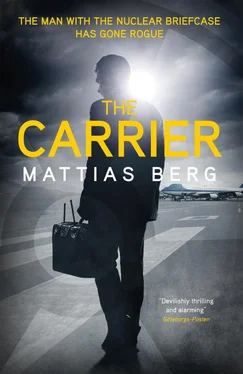Mattias Berg - The Carrier
Здесь есть возможность читать онлайн «Mattias Berg - The Carrier» весь текст электронной книги совершенно бесплатно (целиком полную версию без сокращений). В некоторых случаях можно слушать аудио, скачать через торрент в формате fb2 и присутствует краткое содержание. Город: London, Год выпуска: 2019, ISBN: 2019, Издательство: MacLehose Press, Жанр: Триллер, на английском языке. Описание произведения, (предисловие) а так же отзывы посетителей доступны на портале библиотеки ЛибКат.
- Название:The Carrier
- Автор:
- Издательство:MacLehose Press
- Жанр:
- Год:2019
- Город:London
- ISBN:978-0-85705-788-4
- Рейтинг книги:4 / 5. Голосов: 1
-
Избранное:Добавить в избранное
- Отзывы:
-
Ваша оценка:
- 80
- 1
- 2
- 3
- 4
- 5
The Carrier: краткое содержание, описание и аннотация
Предлагаем к чтению аннотацию, описание, краткое содержание или предисловие (зависит от того, что написал сам автор книги «The Carrier»). Если вы не нашли необходимую информацию о книге — напишите в комментариях, мы постараемся отыскать её.
The Carrier — читать онлайн бесплатно полную книгу (весь текст) целиком
Ниже представлен текст книги, разбитый по страницам. Система сохранения места последней прочитанной страницы, позволяет с удобством читать онлайн бесплатно книгу «The Carrier», без необходимости каждый раз заново искать на чём Вы остановились. Поставьте закладку, и сможете в любой момент перейти на страницу, на которой закончили чтение.
Интервал:
Закладка:
Trinity, our youngest, was the antithesis of Duality and was sitting closest to John in her new purple dress. Seemed totally unafraid, as ever, although of course tired and nonplussed about the situation. She had always been a little rash for her age; not many seven-year-olds were prepared to take the risks she did. I was struck by the fact that she kept her left hand stuffed into a pocket in her dress. I couldn’t help wondering if she had hurt it in some way, and began to worry the way a parent does.
Amba had still allowed our youngest to sit closest to the enormous John, like some sort of shield. And surely nobody who saw all that innocence and naïvety, Trinity’s childish belief that she would soon conquer the world, that everything lay open before her despite her father’s disappearance, could touch a hair on her head. Or maybe one person after all.
That man was almost touching the seven-year-old’s fair head with his swelling muscles, crammed into his tight white T-shirt, already transparent with sweat. John put me in mind more of a torturer than a bodyguard. Which of course was the intention.
Time passed, as oppressive as everything else. I tried to stop myself from looking at my watch, could not allow the repetition to drive me out of my mind. Edelweiss knew better than anyone how to exploit the fact that waiting can cause severe psychological damage in itself. That awareness that something is going to be done—but not what, not how, not by whom to whom, nor why.
At short intervals my family began to look up, one after the other, to fix their eyes on us on the opposite bench. Seemed to be gaining some sort of courage, or perhaps it was the reverse: a collective sense that it was already all too late. That resignation which, according to our psychologists, could travel from person to person in roughly the way yawning does. Between individuals, members of a social group, even in a room full of strangers, proof of how empathic human beings are. So we were trained not to yawn when others started. To be able to resist our empathic instinct.
In the mirror along the opposite wall I saw Jesús María, sitting to my right, staring straight ahead. At the group on the other side of the room—or rather at John, from the very first moment. With a dull hatred that could almost be heard vibrating in the room. Ingrid too looked right across the room, let her eyes travel back and forth across the group.
So in the end I had to do the same. So as not to stand out, reveal my identity in a way which could prove fatal: not only to myself, but more importantly to my former family. Because naturally I had no idea what John and Edelweiss now meant to do with them. Who was prey and who hostage—and who would be sacrificed on the altar.
Which was the next phase in Edelweiss’ devilish piece of theater. The very fact that he had made the arrangements so overwhelmingly complex—that none of us knew who in the room was a prisoner and who some sort of witness. Whether we, or they, came here freely, or were on the run, or in custody. What was going to happen, even in the next few moments. Who knew what about whose arrangements.
That there was no possibility for me, or actually any of us here on this bench, to make our positions clear to the others with the necessary speed.
Because even if I suddenly decided to change course, to try to get myself and my family out of this escape-proof space, how could I make them trust me? Reveal both myself and my intentions swiftly, to make them want to follow me? Explain the intricacy of the situation, with my unknown face beneath its heavy disguise—before John or maybe Ingrid took down both me and my family, either together or one by one?
The only way to loosen the knot was through violence. I would even have to neutralize my family, temporarily, first Amba and then the kids, before I could get them out of here. And that would be way too complicated even for me.
This was nothing less than a live exam in Edelweiss’ favorite game: “Everybody against everybody”. The exact thing we had trained for in narrow tunnel systems deep below our nuclear bases or in desert landscapes, the sky black with smoke from fires and explosions, with no clear view in any direction.
It invariably ended in furious violence, since mankind had never yet been able to find any other solution to insoluble problems. That was why we did not need more than a single guard in here, although in this case it was John. Because mutinying prisoners seldom act together but usually kill each other first, like scorpions in a small glass jar. And because there was in any case no chance of getting out of “Fort Knox” alive.
Soon we found ourselves in the next phase, following the usual pattern, when the reality of the situation started to sink in for my ex-family as well. One after the other they came to realize that in all likelihood none of us would be able to get them away from here: that we who were sitting on the benches opposite were just as much prisoners as they themselves, maybe more so. So each of them gradually deflated, in roughly the same way. Finally even Amba, and little Trinity, until recently so rock hard.
It was still quiet in the room. I glanced at my watch again, despite myself, and with increasing frequency, not least to get some momentary relief from the unbearable sight of my former family breaking apart opposite us. One moment it might be 01.53 and the next—after what seemed like an eternity—only 01.58. Then barely three minutes passed before I found myself looking at my watch again. It was a classic psycho-physiological effect. Time passed increasingly slowly in the locked room. In the end it more or less stood still.
Having no alternative, I kept doing what Edelweiss had always recommended for situations one did not comprehend: waited for the next move. In the worsening heat—that too presumably part of the game—my intake of breath began to burn at the back of my throat. At 02.26 my wrist-watch told me the temperature in the room had risen to 102.7 degrees. My family’s movements became ever slower. Unity and Duality were whimpering softly, Trinity kept on nodding off, in the almost drugged way of someone in an overheated bedroom.
Only Amba remained braced. Ready for the fight, still watchful. Sometimes she would stare right into my face. Again that look, as if searching for a name that was on the tip of her tongue, some celebrity she had no personal connection with. As if she had vaguely recognized me from a newspaper photograph, under the heading “Wanted”.
When my watch showed 02.43 and 107.8 degrees, I felt the blessing of fatigue for the first time. The sounds of dozing throughout the silent, hot room—all three children had now fallen asleep—were hypnotic. Even Amba’s eyelids were drooping. It was impossible not to follow, and in the mirror I thought I could see how Ingrid too was struggling to keep awake. Only Jesús María still stared straight ahead, unbending. At John, who was in the same position as earlier: stock still, eyes turned down, fingertips together. The only sound which could be heard, softly but with increasing frequency, was that of John’s heavy drops of sweat landing on the tiled floor, like Chinese water torture.
My next glance at the watch showed 02.57. I became more and more convinced that there would be no initiative at all from Edelweiss. That he wanted to let us melt into one single piece, like a grotesquely deformed tin soldier, here in the hellish heat.
And just at that moment, of course, came his next move. Just on the stroke of 3.00 a.m.
That was also when I first realized why he had arranged for us to be placed just like this. Amba and the children on the bench with the word INTERVIEWER burned into the wood, we on the opposite bench with the word INTERVIEWEE. Because John slowly got to his feet. Turned his head toward my family, tapped the children on the shoulder until they had woken out of their deep sleep, broke the now nearly three-hour-long silence.
Читать дальшеИнтервал:
Закладка:
Похожие книги на «The Carrier»
Представляем Вашему вниманию похожие книги на «The Carrier» списком для выбора. Мы отобрали схожую по названию и смыслу литературу в надежде предоставить читателям больше вариантов отыскать новые, интересные, ещё непрочитанные произведения.
Обсуждение, отзывы о книге «The Carrier» и просто собственные мнения читателей. Оставьте ваши комментарии, напишите, что Вы думаете о произведении, его смысле или главных героях. Укажите что конкретно понравилось, а что нет, и почему Вы так считаете.












